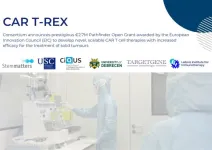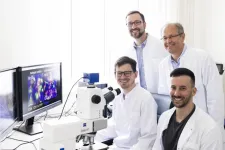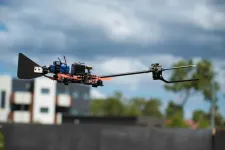(Press-News.org) Researchers have developed a new design for computer memory that could both greatly improve performance and reduce the energy demands of internet and communications technologies, which are predicted to consume nearly a third of global electricity within the next ten years.
The researchers, led by the University of Cambridge, developed a device that processes data in a similar way as the synapses in the human brain. The devices are based on hafnium oxide, a material already used in the semiconductor industry, and tiny self-assembled barriers, which can be raised or lowered to allow electrons to pass.
This method of changing the electrical resistance in computer memory devices, and allowing information processing and memory to exist in the same place, could lead to the development of computer memory devices with far greater density, higher performance and lower energy consumption. The results are reported in the journal Science Advances.
Our data-hungry world has led to a ballooning of energy demands, making it ever-more difficult to reduce carbon emissions. Within the next few years, artificial intelligence, internet usage, algorithms and other data-driven technologies are expected to consume more than 30% of global electricity.
“To a large extent, this explosion in energy demands is due to shortcomings of current computer memory technologies,” said first author Dr Markus Hellenbrand, from Cambridge’s Department of Materials Science and Metallurgy. “In conventional computing, there’s memory on one side and processing on the other, and data is shuffled back between the two, which takes both energy and time.”
One potential solution to the problem of inefficient computer memory is a new type of technology known as resistive switching memory. Conventional memory devices are capable of two states: one or zero. A functioning resistive switching memory device however, would be capable of a continuous range of states – computer memory devices based on this principle would be capable of far greater density and speed.
“A typical USB stick based on continuous range would be able to hold between ten and 100 times more information, for example,” said Hellenbrand.
Hellenbrand and his colleagues developed a prototype device based on hafnium oxide, an insulating material that is already used in the semiconductor industry. The issue with using this material for resistive switching memory applications is known as the uniformity problem. At the atomic level, hafnium oxide has no structure, with the hafnium and oxygen atoms randomly mixed, making it challenging to use for memory applications.
However, the researchers found that by adding barium to thin films of hafnium oxide, some unusual structures started to form, perpendicular to the hafnium oxide plane, in the composite material.
These vertical barium-rich ‘bridges’ are highly structured, and allow electrons to pass through, while the surrounding hafnium oxide remains unstructured. At the point where these bridges meet the device contacts, an energy barrier was created, which electrons can cross. The researchers were able to control the height of this barrier, which in turn changes the electrical resistance of the composite material.
“This allows multiple states to exist in the material, unlike conventional memory which has only two states,” said Hellenbrand.
Unlike other composite materials, which require expensive high-temperature manufacturing methods, these hafnium oxide composites self-assemble at low temperatures. The composite material showed high levels of performance and uniformity, making them highly promising for next-generation memory applications.
A patent on the technology has been filed by Cambridge Enterprise, the University’s commercialisation arm.
“What’s really exciting about these materials is they can work like a synapse in the brain: they can store and process information in the same place, like our brains can, making them highly promising for the rapidly growing AI and machine learning fields,” said Hellenbrand.
The researchers are now working with industry to carry out larger feasibility studies on the materials, in order to understand more clearly how the high-performance structures form. Since hafnium oxide is a material already used in the semiconductor industry, the researchers say it would not be difficult to integrate into existing manufacturing processes.
The research was supported in part by the U.S. National Science Foundation and the Engineering and Physical Sciences Research Council (EPSRC), part of UK Research and Innovation (UKRI).
END
New type of computer memory could greatly reduce energy use and improve performance
2023-06-23
ELSE PRESS RELEASES FROM THIS DATE:
Study reveals genetic signatures of chickpea's cultural crossroads
2023-06-23
With its nutty flavor and dense nutrient profile, the humble chickpea has captivated palates and nourished civilizations for millennia. From its ancient origins to its widespread use in modern kitchens and restaurants around the world, this legume demonstrates both culinary versatility and cultural significance. Despite prominence in traditional cuisines across several continents, the origin, diversification, and spread of chickpeas throughout the Middle East, South Asia, Ethiopia, and the western Mediterranean have remained a mystery. A new study in Molecular Biology and Evolution titled “Historical ...
Supermarket trolleys set to help diagnose common heart rhythm disorder and prevent stroke
2023-06-23
Edinburgh, UK – 23 June 2023: It could be the shopping trip that saves your life: supermarket trolleys are helping to diagnose atrial fibrillation which can then be treated to prevent disabling or fatal strokes. The research is presented today at ACNAP 2023, a scientific congress of the European Society of Cardiology (ESC).1
“This study shows the potential of taking health checks to the masses without disrupting daily routines,” said study author Professor Ian Jones of Liverpool John Moores University, UK. “Over ...
BU researchers shed light on signaling pathway responsible for head and neck cancers
2023-06-23
FOR IMMEDIATE RELEASE, June 23, 2023
Contact: Gina DiGravio, 617-358-7838, ginad@bu.edu
(Boston)—Despite advances in defining the genomic characteristics of head and neck cancers, these malignancies continue to rank among the deadliest cancers with few targeted therapies available. An important challenge in designing effective treatments is intratumor heterogeneity, the presence of multiple subpopulations of cells with distinct genomic and molecular alterations, with some cells inherently more resistant to certain ...
New EIC project to improve CAR T therapies in solid tumors
2023-06-23
Partners in the international consortium CAR T-REX announce the awarding of a highly competitive EIC Pathfinder Open grant, following the positive evaluation of their project entitled ‘CAR T Cells Rewired to Prevent EXhaustion in the Tumour Microenvironment’. One of 57 projects selected amongst 858 submissions, with a total funding of €2.7M, CAR T-REX was recognised for its radical and ambitious vision to improve the efficacy and safety of CAR T-based solid tumour-targeted cell therapies.
By ...
Magdeburg researchers discover a new mechanism of cancer immune defense
2023-06-23
Modern immunotherapies boost the body's own defenses against cancer. They activate killer T cells of the immune system that can specifically recognize and destroy cancer cells. In many patients, however, cancer cells adapt and become invisible to killer T cells so that the treatment is no longer effective. An interdisciplinary team of researchers from Magdeburg has now discovered a new mechanism that enables the immune system to also eliminate such invisible cancer cells. These findings open up new possibilities ...
City buildings could blow air taxi future off course
2023-06-23
The air taxi market is almost ready for take off, with companies such as Boeing, Hyundai, Airbus and Toyota building fleets to have commuters flitting through the sky. Europe and the US have both drafted new rules to pave the way for air taxis to begin operations within the decade, with Australia’s Civil Aviation Safety Authority (CASA) to follow suit.
Increasingly sophisticated studies over recent years, including a recent paper by RMIT University’s Uncrewed Aircraft Systems (UAS) Research Team, have measured how sudden wind gusts form around city buildings and destabilise aircraft.
Lead researcher and aerospace engineer, Dr Abdulghani Mohamed, who’s ...
Customized treatment for heart failure patients through the use of AI, Amsterdam UMC launches a global consortium
2023-06-23
Heart failure is the leading cause of hospitalisation in those over 65 and research predicts that the condition will increase in global prevalence by almost 50% by 2030. Currently heart failure affects more 64 million people worldwide. In order to reduce the burden of disease on both health systems and patients, Amsterdam UMC is launching, thanks to a Horizon Europe grant of almost 6 million euros, a consortium to look for an AI-powered solution.
Consortium leader and Professor of Precision Medicine at Amsterdam UMC, Folkert Asselbergs explains ...
Terasaki Institute for Biomedical Innovation announces cultivated meat spinout company
2023-06-23
(LOS ANGELES) – June 23, 2023 - The Terasaki Institute for Biomedical Innovation (TIBI) is excited to unveil their first spinout company, Omeat, an organization dedicated to technology for the sustainable production of beef and other meats on a global scale. Omeat produces cultivated meat, using cost-effective, humane, and efficient methods to collect regenerative factors for cell cultivation from healthy, living cows.
The Omeat technology was initially conceived and developed by TIBI scientists four years ago, under the leadership of TIBI Director ...
A new species of early toothed whale
2023-06-23
Have you ever wondered what the earliest ancestors of today’s dolphins looked like? Then look no further, meet Olympicetus thalassodon, a new species of early odontocete, or toothed whale, that swam along the North Pacific coastline around 28 million years ago. This new species is one of several that are helping us understand the early history and diversification of modern dolphins, porpoises and other toothed whales. The new species is described in a new study published in the open access journal ...
Yearly re-scanning not needed for common brain tumor detected in 1 in 10 people
2023-06-23
People with a common type of benign brain tumour detected in around 1 in 10 don’t require annual scans, a new national study has found.
The largest study of its kind has been published in the European Journal of Endocrinology and looks at clinical data on a type of tumour growth in the pituitary gland in the brain. The common growth, called a non-functioning pituitary microadenoma (NFPA), is less than 1cm across, is predicted to affect around 10% of the population and usually doesn’t cause any symptoms.
In the ...




